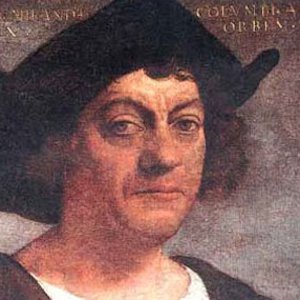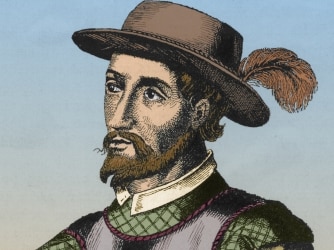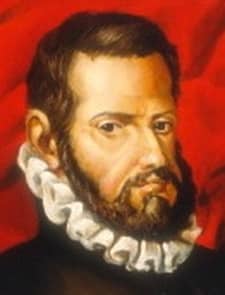Spanish explorers greatly affected the Age of Exploration. They discovered many new routes, new people, and “new” territory. Some of the explorers who impacted the Age of Exploration are Christopher Columbus, Pedro Menendez de Aviles, and Juan Ponce de Leon.
Christopher Columbus, probably the most well-known and wealthiest explorer, added a new chapter to the Age of Exploration, for better or for worse. Until disproved recently, he was the  first European to set foot on American soil, which had an extremely positive change on Europe, especially for Spain and Portugal. Columbus got funds from Spain and sailed west. When he reached land in the Bahamas, he thought he was in the Indies, but was indeed in America. Columbus discovered two whole new continents by simply believing there was nothing there. If he had not been crazy and determined enough to take a west route and try to be different, the world would not be the same. Columbus also changed everything for the Native Americans, but not positively. When he found America in 1493, the “Indians” were not treated peacefully or with any respect whatsoever.
first European to set foot on American soil, which had an extremely positive change on Europe, especially for Spain and Portugal. Columbus got funds from Spain and sailed west. When he reached land in the Bahamas, he thought he was in the Indies, but was indeed in America. Columbus discovered two whole new continents by simply believing there was nothing there. If he had not been crazy and determined enough to take a west route and try to be different, the world would not be the same. Columbus also changed everything for the Native Americans, but not positively. When he found America in 1493, the “Indians” were not treated peacefully or with any respect whatsoever.
Juan Ponce de Leon changed the Age of Exploration. He was the first European to make contact with the Floridian tribes. During April  1513, he discovered the peninsula which is today known as Florida but was dubbed Pascua de Florida by Ponce, which means “place of flowers” in English. If Ponce de Leon had not discovered Florida, then history would be very different. Florida has lots of history, and Ponce de Leon triggered some of the events that happened. He paved the way for explorers like Pedro Menendez de Aviles to colonize Florida. Ponce was also the first conquistador to be honored by Spain in the way he was. When he came back from Florida to Puerto Rico, where he lived, and found his house was destroyed but his family alive, he sailed back to Spain. Upon arrival, the Spanish king knighted AND given his own special coat of arms. What an honor! Ponce de Leon must have been so revered in Spain, especially since he was buried in a church and then a cathedral. Only wealthy famous conquistadors get buried in cathedrals. He was definitely a prosperous man. So, Ponce’s contributions to Florida affected the world, and the way he was honored was also a milestone for Spanish conquistadors.
1513, he discovered the peninsula which is today known as Florida but was dubbed Pascua de Florida by Ponce, which means “place of flowers” in English. If Ponce de Leon had not discovered Florida, then history would be very different. Florida has lots of history, and Ponce de Leon triggered some of the events that happened. He paved the way for explorers like Pedro Menendez de Aviles to colonize Florida. Ponce was also the first conquistador to be honored by Spain in the way he was. When he came back from Florida to Puerto Rico, where he lived, and found his house was destroyed but his family alive, he sailed back to Spain. Upon arrival, the Spanish king knighted AND given his own special coat of arms. What an honor! Ponce de Leon must have been so revered in Spain, especially since he was buried in a church and then a cathedral. Only wealthy famous conquistadors get buried in cathedrals. He was definitely a prosperous man. So, Ponce’s contributions to Florida affected the world, and the way he was honored was also a milestone for Spanish conquistadors.
Pedro Menendez de Aviles was necessary to this era in several ways. He had several accomplishments in claiming land for Spain. Menendez was sent by Spain to drive out the French, which was crucial in getting more land for Spain. He was, in this way, just like any other explorer; he was out for gold, God, and glory. Menendez was also one of the few peaceful explorers who did not immediately attack at first sight of natives. In 1566, he signed a treaty with the Calusa tribe that stated the tribe would give food to the Spanish in exchange for gold, and married the leader’s sister, whom he converted to Catholicism along with the rest of the tribe. To further spread the religion among the natives, he shipped in priests from Spain. Meanwhile, he was taking control of Florida by starting the first permanent European settlement in America, St. Augustine, and made two watch towers, one in Cape Canaveral and one in Biscayne Bay. It was most likely appreciated by the Calusas that they were not massacred. Any tribe would pick the lifestyle of a Catholic worker (with gold!) over no life at all. Therefore, Menendez was just like any other explorer in some ways, but was more rational and peaceful than the rest.
which was crucial in getting more land for Spain. He was, in this way, just like any other explorer; he was out for gold, God, and glory. Menendez was also one of the few peaceful explorers who did not immediately attack at first sight of natives. In 1566, he signed a treaty with the Calusa tribe that stated the tribe would give food to the Spanish in exchange for gold, and married the leader’s sister, whom he converted to Catholicism along with the rest of the tribe. To further spread the religion among the natives, he shipped in priests from Spain. Meanwhile, he was taking control of Florida by starting the first permanent European settlement in America, St. Augustine, and made two watch towers, one in Cape Canaveral and one in Biscayne Bay. It was most likely appreciated by the Calusas that they were not massacred. Any tribe would pick the lifestyle of a Catholic worker (with gold!) over no life at all. Therefore, Menendez was just like any other explorer in some ways, but was more rational and peaceful than the rest.
In conclusion, Christopher Columbus, Pedro Menendez de Aviles, and Juan Ponce de Leon were highly important figures to the Age of Exploration. Without Juan Ponce de Leon, Pedro Menendez de Aviles would have had to make connections with the tribes for the first time and probably would not have had Florida as Spain’s territory. Without Christopher Columbus, America would have probably not been discovered until much later if at all, and it would most likely not belong to Spain. Without any of them, Florida and the rest of the lower North and upper South America would not have any Spanish culture or background whatsoever. The Age of Exploration would not have been the same if not for these three revered explorers.
